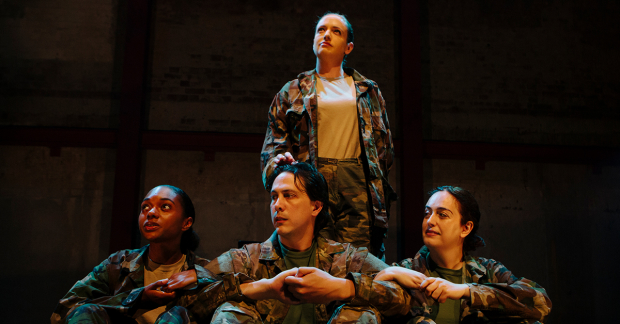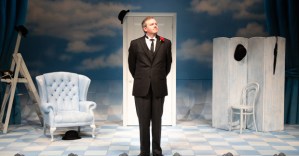
© Thomas Turpie
War, what is it good for? Pretty much nothing in the mind of Howard Zinn, America's late radical historian whose words are given new life in The Time of Our Lies. Bianca Bagatourian arranges the ideas from the WWII bombardier-turned-academic into an urgent, surprisingly watchable polemic about political deceit and the value of history lessons.
On this particular evening, stand-in Martina Laird does a splendid job as Zinn with barely 24 hours' notice. A seated Zinn is imagined, perhaps in lecture mode, reflecting on his own role in Allied bombing campaigns. Many civilians were killed while targeting the Nazis with napalm; to say nothing of the twin apocalypses of Hiroshima and Nagasaki. Later the horrors Vietnam and Iraq are considered. To Zinn, all these US expeditions have been in aid of a dubious concept of patriotism.
Yet he refused to be labelled a pacifist, and some of the most stimulating passages see Laird grappling with possibility that some small, targeted violence (as with the A-bombs in Japan) may stop further violence. Nuance and moral relativism are brought out nicely. Zinn is seen concluding that the real evil is ignorance; a populace unaware of history and easy to lie to about the upsides of war. Laird relishes the quote: "civil disobedience is not our problem. Our problem is civil obedience."
All of the above is more stirring than the university seminar it may appear to be – even if the optics are plain. Director Ché Walker plays it out on a bare stage; his show striving for impact via simple word and movement. At times, khaki-clad members of the ensemble are made to writhe around under a blood-red spotlight, as if under torture or suffering an agonising death in battle.
There are even interludes of singing, and the ensemble pipe up with monologues about the plight of immigrants and non-white people in America. While these are a worthwhile subject matter, they balloon into a vague territory of liberal politics and detract from the play's exploration of conflict. At one point, a Trump impression is whipped out, and it's rather good – but also out-of-tone and slightly irrelevant, because the one thing the US President can't yet be accused of is starting an actual war.
It's no bad thing that the additional strands hint at Zinn's sprawling body of work and influence, since his name carries less weight on British shores (the spectre of the Vietnam War likewise). His anti-war rationale does not seem new in 2019; nor is the play able to consider the reality that most modern conflict is fought on keyboards. But what feels more timely than ever is Zinn's argument that populations can be manipulated quite simply by lies or emotive rhetoric. It makes for a thought-provoking watch in the era of fake news – and equally those leaders who like to cry fake news.



















